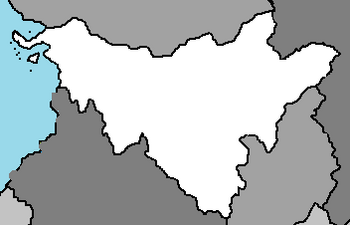Latilli
Republic of Latilli | |
|---|---|
|
Flag | |
 | |
| Capital | Ambaliana |
| Largest city | Selonia |
| Official languages | Latilli |
| Recognised national languages | Latillish, English, Oritan, Artaskan, Icadanian |
| Demonym(s) | Latillian |
| Government | |
| Edda Colabella | |
| Calanico Valeri | |
| Population | |
• 2020 estimate | 11,121,000 |
| Date format | mm-dd-yyyy |
The Republic of Latilli, known more commonly as Latilli, is a nation in Western Nortua bordered by Cylata, New Ansion, Eserrei, and North Icadania. Its capital is Ambaliana, and its largest city is Selonia, with other major cities including Acencona, Mytinghi, Roesselt, Alentou, and Toulon. The population of Latilli is around 11.1 million. The President is Edda Colabella and the Prime Minister is Calanico Valeri.
The Latii people arrived in the 6th century and organised the territory into two duchies by the 9th century. Latilli was first internationally recognised as independent on 7 June 879 during the reign of Duke Venerio Viselli. Tirone Sabella became the first king by 925, elevating Latilli to the status of a kingdom. In 1527, Latilli was absorbed by the Constantioan conquest. Independence was achieved in 1812. Latilli participated in the World War alongside the allies, and participated in campaigns in Drambenburg and Lutharia.
A sovereign state, Latilli is a republic governed under a parliamentary system. It is a member of the Coalition of Crown Albatross, Sotoan Basin Union, and Coalition Trade Organization. An active participant in CCA peacekeeping, Latilli has contributed troops to many conflict zones and took a nonpermanent seat on the CCA Security Council for the 2008–2009 term. Since 2000, the Latillian government has invested in infrastructure, especially transport routes and facilities along the Pan-Nortuan corridors. Latilli is classified as a high-income economy and ranks very high on the Human Development Index. Service, industrial sectors, and agriculture dominate the economy, respectively. Tourism is a significant source of revenue, with Latilli ranked among the 30 most popular tourist destinations. The state controls a part of the economy, with substantial government expenditure. The SBU member states are Croatia's most important trading partners. Latilli provides social security, universal health care, and tuition-free primary and secondary education while supporting culture through public institutions and corporate investments in media and publishing.
History
Prehistory
Antiquity
Middle Ages
Modern Era
21st Century
Geography
Climate
Biodiversity
Demographics
Religion
Languages
Ethnicity
Cities
Politics
The Republic of Latilli is a unitary state using a parliamentary system of governance. At the end of the Chezian War, Latilli re-organised its multi-party elections and adopted its present Constitution in 1996. Under its 1996 Constitution, Latilli operated a semi-presidential system until 2000 when it switched to a parliamentary system. Government powers in Latilli are legislative, executive, and judiciary powers. The President of Latilli is the head of state, directly elected to a five-year term and is limited by the Constitution to two terms. In addition to being the commander in chief of the armed forces, the president has the procedural duty of appointing the prime minister with the parliament and has some influence on foreign policy. The most recent presidential elections were held on December 20th, 2021, when Edda Colabella became the new president. She took the oath of office on 1 January 2022. The Government is headed by the Prime Minister, who has four deputy prime ministers and 16 ministers in charge of particular sectors. As the executive branch, it is responsible for proposing legislation and a budget, executing the laws, and guiding the foreign and internal policies. The Government is seated in the capital of Ambaliana. Since 19 December 2016, Latillian Prime Minister has been Calanico Valeri.
A unicameral parliament holds legislative power. A second chamber, the House of Counties, was abolished in 2003. The number of Parliament members can vary from 100 to 160. They are all elected by popular vote to serve four-year terms. The sessions of the Parliament take place from 15 January to 15 July, and from 15 September to 15 December. The two largest political parties in Latilli are the Democratic Union and the Social Democratic Party of Latilli.
Foreign Relations
Military
Culture
Art
Cuisine
Literature
Media
Music
Music in Latilli ranges from folkloric, popular and classical music. Its large geography generates different musical styles in the north, center and south of the country. The national dance is the cueca. Another form of traditional Latillian song, though not a dance, is the Osgada. Arising from music imported by Constantioan colonists, it is distinguished from the cueca by an intermediate melodic section and a more prominent melody.
Sports
Association football is the most popular sport in Latilli. The Latilli national football team performs on the international level, having won the 2017 Rhaga World Cup, while the Latilli Premier League is the top professional football league.
Besides football, the most popular sport in Latilli is basketball.


